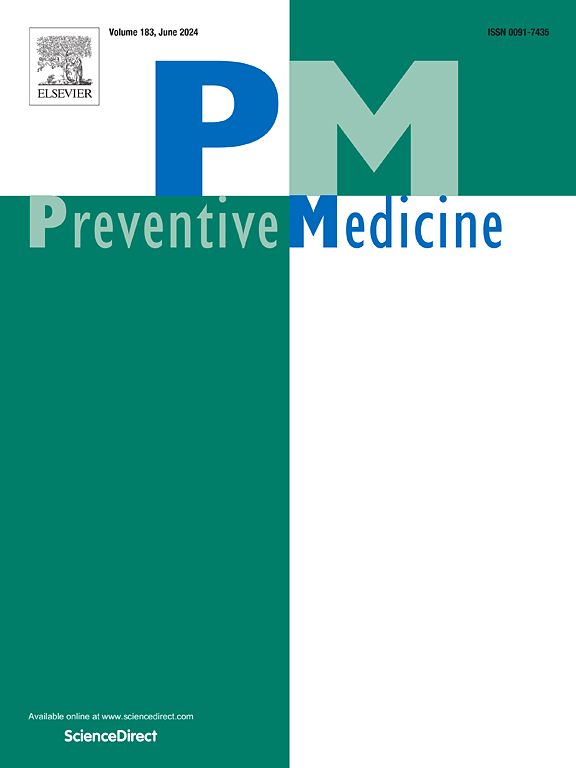Association of watching sports games with subsequent health and well-being among adults in Japan: An outcome-wide longitudinal approach
IF 4.3
2区 医学
Q1 MEDICINE, GENERAL & INTERNAL
引用次数: 0
Abstract
Objective
Although the health benefits of playing sports are well-known, the association between watching sports and health is not well understood. We examined the longitudinal association of watching sports with 20 different health and well-being outcomes.
Methods
Three-wave cohort data from 6327 adults (4851 workers) in the Meiji Yasuda LifeStyle study were used to draw causal inferences. We assessed the frequency of watching sports games on media or in-person using a self-reported questionnaire in 2018. Outcomes, including health behaviors, physical, mental, and work-related outcomes, were evaluated in 2019. In 2017, sociodemographic factors, prior exposure, and outcome values were evaluated and used as covariates. Three different statistical models (logistic, modified Poisson, or linear regression) were used according to the nature of the outcome variable.
Results
Watching sports on media had a favorable dose-response association with a lower risk of becoming physically inactive and skipping breakfast, as well as higher happiness (p for trend < 0.05). Conversely, watching sports on media had an adverse dose-response association with higher body mass index and increased risks of developing hypertension and diabetes (p for trend < 0.05). Watching sports in-person had a dose-response association with lower risks of exhibiting the precontemplation stage of health behavior change, moderate/severe psychological distress, and dyslipidemia (p for trend < 0.05).
Conclusions
Despite the observed detrimental association between watching sports and cardiometabolic health, which should be interpreted cautiously and studied further, the study findings suggest that watching sports could be a new modifiable protective factor for developing healthy lifestyles and improving mental well-being.
日本成年人观看体育比赛与日后健康和幸福的关系:全结果纵向方法。
目的:虽然参加体育运动对健康的益处众所周知,但观看体育比赛与健康之间的关系却不甚了解。我们研究了观看体育比赛与 20 种不同的健康和幸福结果之间的纵向联系:方法:我们利用明治安田生活方式研究中 6327 名成年人(4851 名工人)的三波队列数据进行因果推论。我们使用自我报告问卷评估了 2018 年通过媒体或亲自观看体育比赛的频率。2019年对结果进行了评估,包括健康行为、身体、精神和工作相关结果。2017 年,对社会人口学因素、先前接触情况和结果值进行了评估,并将其作为协变量。根据结果变量的性质,采用了三种不同的统计模型(逻辑模型、修正泊松模型或线性回归模型):结果:在媒体上观看体育比赛与降低不运动和不吃早餐的风险以及提高幸福感有良好的剂量反应关系(趋势 p < 0.05)。相反,在媒体上观看体育比赛与体重指数升高、高血压和糖尿病发病风险升高有不利的剂量反应关系(趋势 p < 0.05)。亲自观看体育比赛与健康行为改变的前考虑阶段、中度/重度心理困扰和血脂异常的风险较低呈剂量反应关系(p为趋势 < 0.05):尽管观察到观看体育比赛与心血管代谢健康之间存在不利的关联,对此应谨慎解释并进一步研究,但研究结果表明,观看体育比赛可能是发展健康生活方式和改善心理健康的一个新的可调节保护因素。
本文章由计算机程序翻译,如有差异,请以英文原文为准。
求助全文
约1分钟内获得全文
求助全文
来源期刊

Preventive medicine
医学-公共卫生、环境卫生与职业卫生
CiteScore
7.70
自引率
3.90%
发文量
0
审稿时长
42 days
期刊介绍:
Founded in 1972 by Ernst Wynder, Preventive Medicine is an international scholarly journal that provides prompt publication of original articles on the science and practice of disease prevention, health promotion, and public health policymaking. Preventive Medicine aims to reward innovation. It will favor insightful observational studies, thoughtful explorations of health data, unsuspected new angles for existing hypotheses, robust randomized controlled trials, and impartial systematic reviews. Preventive Medicine''s ultimate goal is to publish research that will have an impact on the work of practitioners of disease prevention and health promotion, as well as of related disciplines.
 求助内容:
求助内容: 应助结果提醒方式:
应助结果提醒方式:


